

(Editor’s Note: This post, by Kathleen Peine, originally appeared at L.A. Progressive.)
There’s something buried in a new Pennsylvania law and it’s every bit as toxic as the chemicals used to unearth natural gas through that process called fracking. Lurking in that law is a form of enforced ignorance.
And as Will Rogers said, “When ignorance gets started, it knows no bounds.”
In this law there is a provision that essentially gags physicians when they want to tell their patients what particular chemicals they have been exposed to, should they become ill from exposure to fracking chemicals. The doctors will be required to sign confidentiality agreements in order to find out the components in their quest to treat stricken individuals. The law is advanced as a protection of proprietary secrets……as if we’re talking about New Coke here.
» Read more about: Pennsylvania Doctors on Fracking: Our Lips Are Sealed »


(Our coverage of Los Angeles’ 1992 civil unrest continues with this post by Martín Hernandez, a former Bus Riders Union organizer, L.A. Weekly theater critic and a currently “overworked Social Worker with L.A. County’s Department of Public Social Services.” He is also an SEIU Local 721 shop steward.)
“Maybe we should break into Circuit City and get us some new computers.”
I remember this idea floated among me and other volunteers who worked for a cash-strapped State Assembly candidate’s campaign when the fires and “looting” erupted after the not-guilty verdict for the cops accused of beating Rodney King. Ours was a dark attempt at humor as decades of pent-up rage exploded around Los Angeles, unleashed from people too long oppressed based on the color of their skin and their lack of the color of money. Even a prominent Latina politician opined one night in our Montebello campaign office that the only time “they” pay attention to “us” was when “we” burned things down.
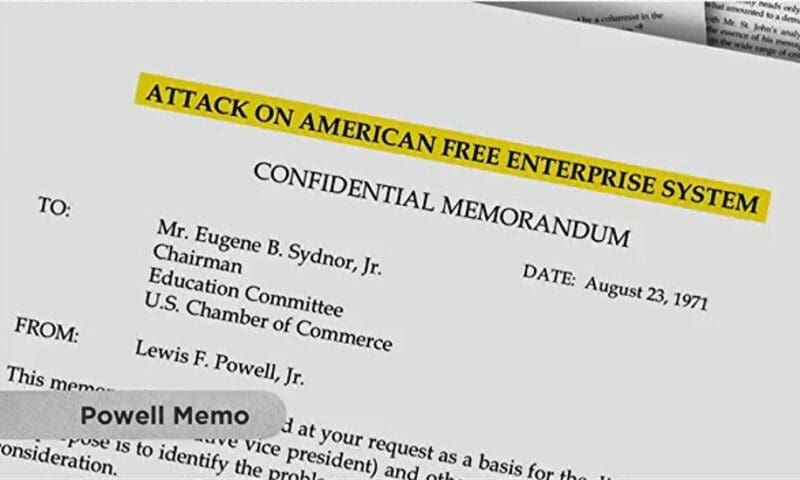
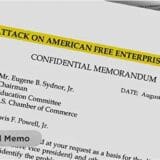

Heist, a new film by Frances Causey and Donald Goldmacher, joins the growing list of angry documentaries chronicling the destruction of America’s economy and its middle class by powerful corporate forces. Like Inside Job and just about any title in the Brave New Films catalog, Heist gets our blood boiling with its money-pile graphics and occasional glib comments exhaled by Wall Street fat cats. Call this genre the Cinema of Outrage.
Subtitled Who Stole the American Dream?, the film breaks away from the pack, however, by drilling deep to explain how we came to find ourselves on the verge of where Argentina was a dozen years ago. The film also eschews conspiracist viewpoints and refuses to offer up, say, Alan Greenspan or the Koch brothers as villainous piñatas for us to vicariously bash.
Instead, Causey and Goldmacher soberly state their case that a concerted,
» Read more about: "Heist" Chronicles Theft of American Dream »


(Photographer Ted Soqui’s account of the 1992 events, as told to Frying Pan News, appears below. He covered the violence for the L.A. Weekly and created some the unrest’s most memorable images. In 2011 his photograph of an Occupy L.A. protester was used by Shepard Fairey to produce Time magazine’s Person of the Year cover. This Wednesday afternoon, April 18, Soqui will speak at the Central Library about his experiences as part of the Los Angeles Public Library’s Photographer’s Eye lecture series.)
I was at the Simi Valley courthouse when the jury came in – nobody could believe the verdict, but no one thought the city would blow up. Later I heard something on AM radio about rocks and bottles being thrown at Florence and Normandie,
» Read more about: 1992 Remembered: A Photographer Follows the Smoke »

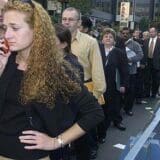
Why is this recovery different from all other recoveries?
Many of the reasons are widely known: Rebounding from a financial crisis takes an excruciatingly long time; the huge decline in housing values has reduced Americans’ purchasing power; large corporations are making do with fewer employees — at least, in this country.
But what really sets the current recovery apart from all its predecessors is this: Almost three years after economic growth resumed, the real value of Americans’ paychecks is stubbornly still shrinking. According to [April 5th’s] Bloomberg Economics Brief, “the pace of income gains is well below that of the past two jobless recoveries and real average hourly earnings continue to decline.”
The Bloomberg report cites one reason for this anomaly: Most of the jobs being created are in low-wage sectors. According to Bloomberg, fully 70 percent of all job gains in the past six months were concentrated in restaurants and hotels,
» Read more about: Harold Meyerson: Economic Recovery for Whom? »
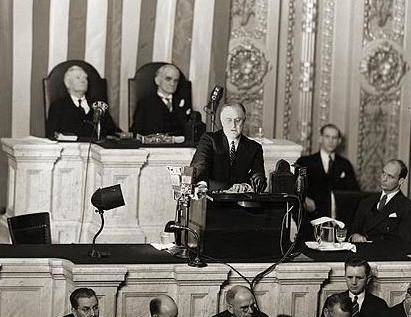
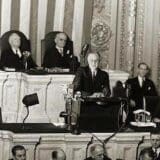
The Supreme Court’s deliberation on the Affordable Care Act goes to the heart of differing visions of the American concept of “freedom” and “liberty.” It’s a debate worth having.
In court this week, Solicitor General Donald B. Verrilli Jr. described what real freedom looks like. “There will be millions of people with chronic conditions like diabetes and heart disease,” he said, “and as a result of the health care that they will get, they will be unshackled from the disabilities that those diseases put on them and have the opportunity to enjoy the blessings of liberty.”
Verrilli’s argument evokes FDR’s famous “Four Freedoms Speech” that included freedom from “want” and “fear.”
FDR repeatedly articulated and elaborated upon those ideals. On June 8, 1934, in a special message to Congress he said:
“[I]n the earlier days, the interdependence of members of families upon each other and of the families within a small community upon each other” [provided fulfillment and security.] “The complexities of great communities and of organized industry make less real these simple means of security.
» Read more about: Affordable Care Act: Freedom from Ignorance »


This month Frying Pan News presents personal stories of L.A.’s April 29-May 4, 1992 explosion. These recollections do not represent the point of view of this blog or its sponsor, the Los Angeles Alliance for a New Economy. In this installment we interview painter Anthony Ausgang, one of the best-known proponents of Los Angeles’ Lowbrow art movement; his psychedelicized images of cartoon cats and rogue hot-rodders have become iconic staples of Southern California galleries.
In 1992 he was the property manager of an eight-unit block of storefront studios near the intersection of Vermont Avenue and Santa Monica Boulevard, an area near Los Angeles City College that would see much arson and looting. He lived in one of the units, which he still manages today; he and his companion, painter Marcy Watton, who lived next door, were taken off-guard by the violence that erupted after the Rodney King verdicts.
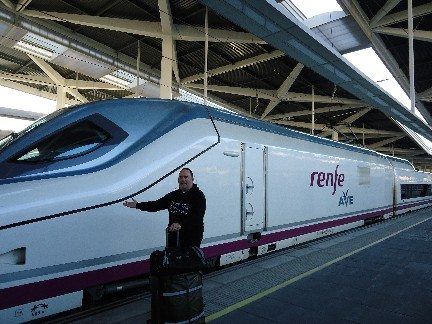

I’ve had the good fortune to travel a bit in Europe and there are a few things I have taken away from my journeys. There seems to more of an enjoyment of the simple things in life over there. Whether it is a having a nice meal or taking a long paid vacation (anywhere from four to eight weeks) every year, people don’t seem as neck-deep in the rat race as we are here in the States.
The European perspective on what’s important also translates into a deep appreciation for long-term planning. I especially noticed this when I found myself looking at one of the thousand-year-old cathedrals that seem to be in every city. A more modern example of how planning is embraced in Europe is its efficient transportation — which made me think of how much we need high-speed rail here in California.
Anyone reading this blog who lives in L.A.
» Read more about: High-Speed Rail: Let’s Think Big Again! »


A few weeks back I was quoted in a blog called Down With Tyranny. The article was about the ongoing dispute over employers asking for employee Facebook passwords, as well as the overly broad social media policies of my own employer, the Hyatt Corporation.
After posting this blog to my own Facebook profile, I was a bit stunned by the quick response from an old conservative classmate from high school who didn’t think there was anything wrong with employers asking job applicants to hand over their passwords as a condition of employment.
“If you don’t like it don’t apply to work there. You are asking them for a paycheck, why can’t they ask you for something?”
A few other commenters joined the conversation including my own Canadian wife, who quickly jumped to my defense — which made me proud and embarrassed,
» Read more about: Life, Liberty and the Pursuit of Facebook: Doomed Rights? »
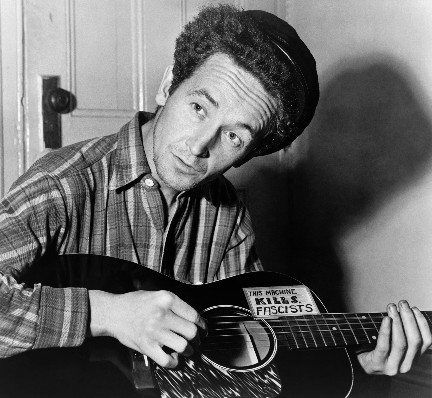
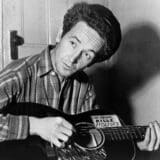
Woody Guthrie — who wrote more than 3,000 songs and is best known for “This Land Is Your Land,” often considered America’s alternative national anthem — had his first big break and taste of success while living in Los Angeles from 1937 to 1940. His experiences in South California during the Depression inspired his radical views about social and political conditions. He wrote songs about families facing foreclosure by unscrupulous banks, migrant Mexican farm workers exploited by agribusiness, and politicians who turned a blind eye to the widespread suffering — topics that unfortunately still resonate today. He also penned patriotic songs about America’s promise and its natural beauty, and angry songs encouraging Americans to organize unions and protest against injustice.
On Saturday, Los Angeles will celebrate Guthrie’s life and legacy, part of a nationwide year-long series of conferences, concerts, and museum exhibits sponsored by the Los Angeles-based Grammy Museum and the New York-based Woody Guthrie Archives.